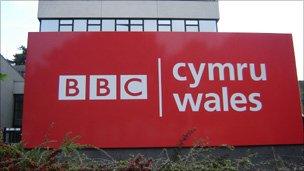BBC Wales will be a 'fearless, ambitious' broadcaster says director
- Published

English language programmes on BBC One and BBC Two Wales reached almost a million viewers a week
BBC Cymru Wales will be "a fearless, ambitious broadcaster", says director Rhodri Talfan Davies in the corporation's annual report.
It was "committed" to making a "real difference" to audiences and Wales, he said.
The Story of Wales had an average audience of over 300,000 and record audience appreciation figures.
Week In Week Out was recognised for its investigation into the University of Wales' degree-awarding system.
The <link> <caption>report</caption> <url href="http://www.bbc.co.uk/wales/info/sites/management/documents/review_wales_2012.pdf" platform="highweb"/> </link> highlighted BBC Wales' achievements during 2010/11 and set out its plan for the coming year.
English language programmes on BBC One and BBC Two Wales reached almost a million viewers each week, with ten series attracting 200,000 viewers or more.
It revealed The Story of Wales, presented by Huw Edwards, was the second most popular of any BBC One programme shown in Wales in the year.
The year also saw the first programmes made at the new BBC drama production facility Roath Lock, Cardiff Bay.
Dramas made there included Casualty, Merlin, Upstairs Downstairs and Sherlock, which attracted audiences of over 10m and international acclaim.
A Tribute to Gary Speed also featured in the top ten programmes watched.
In news, more than half of all adults in Wales - 1.4m - watched at least one BBC Wales Today bulletin a week, which was up from 1.2m last year.
Radio Wales' reach increased from 411,000 to 471,000. The programme The Mousetrap and Me, which told the story of the Newport man whose tragic story of foster care inspired Agatha Christie to write the classic West End play, won two awards.
BBC Wales' interactive sites were accessed by 2.4m browsers a week. This impact was driven by major stories including Gary Speed's death, the Gleision mining accident and the court case following the Antigua honeymoon murders.
<link> <caption>Figures also showed </caption> <url href="http://www.bbc.co.uk/wales/info/sites/management/documents/annualreview_figures_2012.pdf" platform="highweb"/> </link> the number of hours of BBC Wales English language TV originating output fell from 708 to 698 over the year, with overall spending falling from £24.3m to £22.7m in 2010/2011.
For S4C, total hours of BBC Wales originating output fell from 753 to 644, with spending falling from £23.1m to £20.8m.
Mr Davies said: "This was a landmark year for broadcasting in Wales in so many ways, a new partnership between S4C and the BBC, the opening of the UK's largest drama production centre at Roath Lock in Cardiff, the financial challenges of a new licence fee settlement, and the first television history of Wales in more than a quarter of a century."
Looking ahead he added "high-quality journalism will remain the backbone" of BBC Wales' service.
"Through increased efficiency and a reduction in output at times of the day when fewer viewers and listeners are available, our aim is to consolidate the BBC's role as Wales' most trusted news provider by ensuring its journalism is a standard-bearer for accuracy, impartiality and originality," he said.
Mr Davies also wants to increase BBC Wales' presence across the network saying there was "considerable room for improvement".
This year, the BBC and S4C reached an agreement on the future funding and governance of S4C, which will be mainly funded from the licence fee from 2013.
The arrangements protect the editorial and managerial independence of S4C, while ensuring accountability to the BBC Trust for the licence fee funding spent by the service.
The BBC's director general Mark Thompson, who is stepping down in September, said it had been an "extraordinary" year for BBC News but also one of change.
Key priorities for the year ahead included strengthening the "impact and distinctiveness" of services for Wales and improving the specialism and impact of journalism.
The results of the Delivering Quality First savings plan will also be implemented.
- Published16 July 2012
- Published16 July 2012
- Published12 July 2011